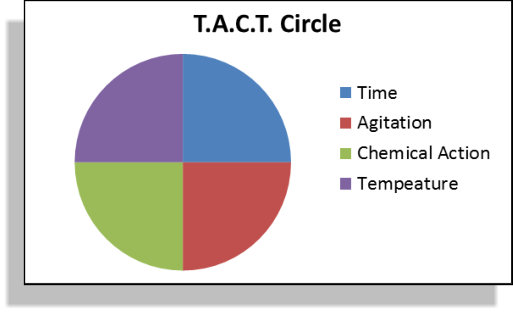
Ever been stuck on a tough cleaning task? About to throw in the towel? Well, there is a little memory device that might be helpful – T.A.C.T.! Using the example of washing dishes, let’s see how the variable of Time, Agitation, Chemical and Temperature can be harnessed to your advantage.
Time
If you are tasked with washing a sink full of crusty pots and pans, what are your options? Break out the steel wool and scrub until your knuckles bleed? Well, that’s an option, but as any lazy person will tell you, “let them soak awhile!” Yes, time is one of the best weapons on your side when working on a cleaning task. Just soaking down a dirty patch, letting the disinfectant dwell a bit longer, or letting the floor stripper soak can make all the world of difference. Add a little time to your project, and see what difference it can make.
Agitation
If you are pressed for time, there’s always the option of adding elbow grease. Yes, this is where the ol’ steel wool comes in! If you were given the option of cleaning the dishes with a kleenex or scouring pad, which would you choose? Intuitively, we know that more scrubbing power takes off more dirt. However, in the moment, sometimes we forget to take advantage of better scrubber power when at work. That white floor pad just not cutting the dirt? Switch to red. Using too many paper towels to clean the counters? Try microfiber instead.
Chemical
Imagine you started doing the dished at home and suddenly realized there weren’t any suds in the sink. You forgot the dish doap, dummy! And do your hands ever really feel clean when you just rinse with water after working outside? Nope! Sometimes a little chemical action is what’s needed to get the job done. Add dish soap to the wash water, strengthen the concentration to the “heavy” level, or consider upgrading from a neutral cleaner to a degreaser to attach those nasty floors.
Temperature
Suppose you are wrapping up the dishes, and someone brings you a forgotten greasy skillet from the stove. There are still bubbles in the water, and the water isn’t too dirty, but it’s gotten cold. First thing you’d do would be add hot water, right? This one is a little controversial, but worth discussing anyway. Certainly, use hot water for your dishes, and use warm water when you wash your hands, but today’s potent cleaning chemistry is actually designed to be effective with cool water. I would NOT recommend heating up your cleaning chemicals, as some of them become more reactive with heat and can actually start to give off irritating fumes. Still, if nothing else is taking up that dirt, consider adjusting the temperature to make your job a bit easier!
